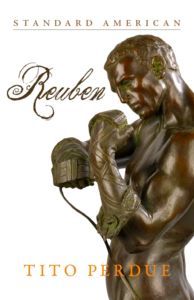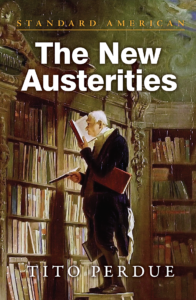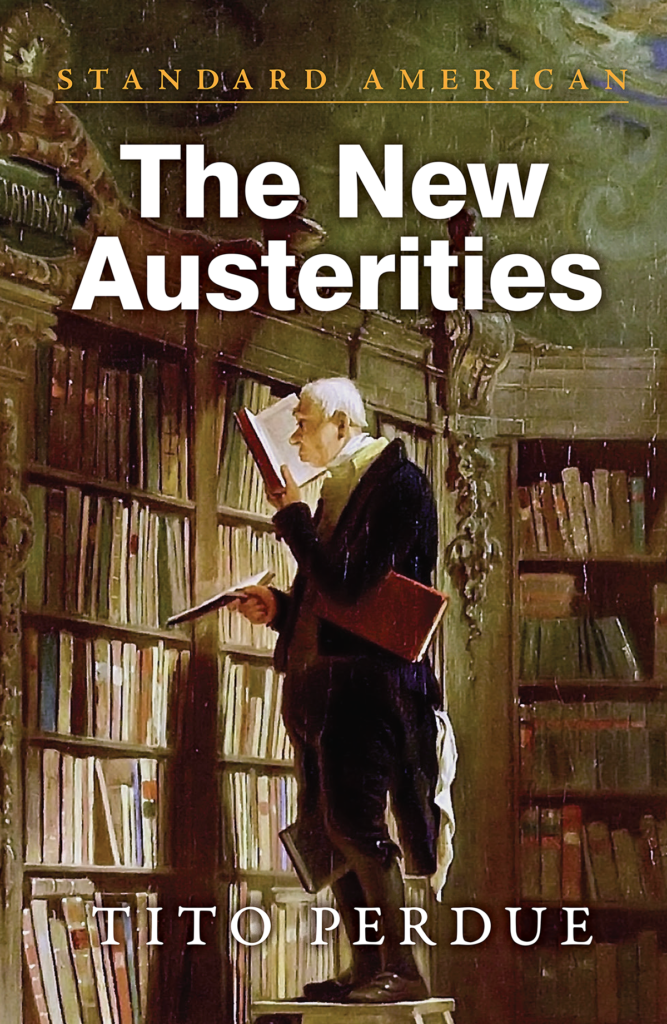The Cultured Thug: Tito Perdue’s Reuben

You can buy Tito Perdue’s novel Reuben here.
2,754 words
Truthfully, in this age those with intellect have no courage and those with some modicum of physical courage have no intellect. If things are to alter during the next fifty years then we must re-embrace Byron’s ideal: the cultured thug. — Jonathan Bowden
Tito Perdue
Reuben, Second Edition
Brent, Ala.: Standard American Publishing Company, 2022
Tito Perdue is America’s greatest living novelist, and Reuben is my favorite of his works. Reuben is a satirical meditation on the fallen state of white America and how a white vanguard might be organized to turn the world around. The story begins when a thug named Reuben chances upon a teacher, Perdue’s alter-ego Lee Pefley, who fashions him into a cultured thug and a man of destiny. Reuben is a masterful piece of writing, moving effortlessly between mythic, epic, and satirical modes. It is also highly entertaining and thought-provoking, with biting humor and arresting turns of phrase on every page.
Perdue’s novels fall into three rough categories. The first are quasi-autobiographical novels on the life, afterlife, and antecedents of Lee Pefley, who is Perdue’s literary alter-ego. This category includes Lee (1991), The New Austerities (1994; second edition, 2023), Opportunities in Alabama Agriculture (1994; second edition, 2023), The Sweet-Scented Manuscript (2004), Fields of Asphodel (2007; second edition, 2023), Morning Crafts (2013), the William’s House quartet (2016), Though We Be Dead, Yet Our Day Will Come (2018), The Smut Book (2018), and Materials for All Future Historians (2020).
Cynosura (2017) and The Philatelist (2018) belong to their own class, although one can argue that even their main characters are alter-egos of the author.
The third category, comprising Reuben plus The Node (2011), Philip (2017), The Bent Pyramid (2018), The Gizmo (2019), and Love Song of the Australopiths (2020), are Perdue’s novels about “turning the world around,” the literal meaning of “revolution” in the cultural and political realms.
These books feature secret societies of disproportionately old and cranky individuals dedicated to reversing the decline of white civilization by both preserving books and culture and by accumulating money, which they cash in for political power as well as new technologies, which they cash in for money and political power.
The division between the Pefley novels and the political novels is not air-tight, since Lee makes appearances in The Bent Pyramid, Philip, and Reuben. In Reuben, he plays an especially important role in Book I as the teacher of the title character.
In its ambitions and outline, Reuben resembles another novel written by an intellectual who wanted to turn the world around: Emile by Jean-Jacques Rousseau. Like Emile, Reuben is named for its main character, who is the pupil of a revolutionary intellectual who is the alter-ego of the author. Like Emile, Reuben is more a child of nature than of the reigning society, which makes them both relatively blank slates for their preceptors’ designs. The goal of both preceptors is to make their students as unfit as possible for the society around them and as powerful as necessary to change their societies to fit them. They are new men who will create and set the norms for new societies. The chief way in which Reuben departs from Emile is by actually showing the pupil revolutionizing the world.
Why are revolutionary intellectuals such as Perdue and Rousseau drawn to the problem of education? A revolutionary’s task is daunting, and the more radical his program, the more dauting the task. How does one overthrow errors and follies that have reigned for thousands of years? The task seems a little less daunting, however, when one realizes that even the most ancient traditions live on only in the minds of our contemporaries. Thus, if traditions are not passed on by the present generation, they will die out. Thus the problem of fundamental cultural and political revolution reduces to a matter of education, and we can do something about that.
The Philosophy
Lee was a great admirer of ancient Greece, which prized excellence above equality and thus reposed power in the hands of the best. His enemy was modern egalitarianism, which empowered the masses, who promptly delivered society into the hands of those who are merely rich, not virtuous. Lee asks Reuben:
Do you sincerely believe that high things are high, and low things low, and higher is better, and all men are utterly unequal? And do you adore what has been done in Europe and especially Greece? And that power properly belongs to those only who have no peers? (ch. 7)
The modern value system is precisely the inverse: “they adore what is weak and dread what is strong” (ch. 27).
Lee’s goal, therefore, was to overthrow the modern and postmodern value systems (moral, political, and aesthetic) and restore the classical one. He wished to bequeath to future generations “a world of tremendous inequality where love and art can flourish” (ch. 15). This society would be “designed to foster genius and excellence as opposed to simple happiness understood as an impossible and unworthy ambition” (ch. 27):
He wanted a crystalline civilization in which shallowness were an actionable offense, a society that makes demands upon people and where beauty was to be pursued at any cost you’d care to name. A high culture . . . all white. With intimidating laws and a trajectory all its own. (ch. 24)
Lee wasn’t a complete reactionary. He embraced modern science and technology. But he wished to infuse them with archaic moral and aesthetic values. In Guillaume Faye’s terms, he was an archeofuturist. For instance, he envisioned a society in which the productivity gains of technological progress would be taken not in the form of more wealth, but of more leisure: He “wanted a delimited country with impenetrable tariffs, a lower standard of living, more modest homes, shorter working hours” (ch. 24). It was also important to “keep the wealth out of ignorant hands” (ch. 12).
Lee did, however, think that the scale of modern, globbal society was too large. Thus he wished to “break the cities into towns” (ch. 12).
In sum, both Lee and Reuben “wanted a small country getting smaller, fine people getting finer, a crystalline civilization of earnest people never so far from libraries and opera houses that they couldn’t walk” (ch. 30).
The Man of Destiny

You can buy Tito Perdue’s novel Opportunities in Alabama Agriculture here.
Lee loved history but hated how it turned out. Thus he was ever vigilant for “a chance to turn the course of events around” (p. 28). When Reuben came into his life, he saw such a chance, and took it.
Ruben is a hillbilly, but he is also a genius. He is described as handsome, brawny, and six-feet-six inches tall. His physicality is an important part of the package. He is a spectacle, a “monster.” His pure physicality allows him to dominate space and cow weaker minds.
But Reuben is far from perfect. He has a lower leg where the flesh has been shorn away in some sort of farm accident. Perdue manages to describe this hideous imperfection in a droll manner, because it is as impossible to visualize as Gogol’s runaway nose, boarding a carriage disguised as a civil servant.
Ruben’s imperfection is necessary for his greatness. Had he been perfect, our society would have seduced him into wasting his time and brilliant intellect as a football-playing, womanizing lout. Reuben’s wound keeps him somewhat aloof from the rest of humanity, especially women, and thus focused on Lee’s mission. It is the heel that allows him to become an Achilles.
As we learn, Lee had found other students, but Reuben was the last and greatest, and the man who got it done.
When Reuben stumbles into Lee’s life, Lee quickly divines his natural qualities. But natural gifts are not enough. They must be cultivated. They must be yoked alongside knowledge and infused with prudence and taste. As Lee says, “What we see here in America is the absolute triumph of quantity over quality. And that’s why your quality has to be larger than their quantity” (ch. 11).
He has a vast library. He can give Reuben free room and board. He settles the lad in, then pours all this knowledge into him, as well as his sense of mission:
“Take my youth” said Lee, “and take my books, take my knowledge, and take my hate.”
The boy nodded. He held the knife, Lee noted, like a harpoon.
“Take my knife,” said Lee one more time, “and drive it up to the hilt in that philosophy there, the one that’s stopped our country from becoming like Greece” (ch. 5).
Are you the one for it? To take the Democracy and break it like an egg? It lies in the gutter, boy, the western crown. Will you be him who picks it up? (ch. 9)
As is clear, Lee has more than a little of the one-pointed and self-consuming fanaticism of Captain Ahab.
Reuben also has a natural streak of ruthlessness that Lee prizes and cultivates. As one of Lee’s allies says to Reuben, “Far too late in the day for pity, Reuben. Promise me that much at least” (ch. 19). As Reuben entered middle age and his mission unfolded, “he had grown a good deal colder than he used to be, inspired more fear, acted with less compunction, and was accomplishing more than he ever had before” (ch. 28).
The Station
After his apprenticeship with Lee, Reuben went out into the big world. Having received a superb liberal education from Lee, Reuben focused his higher education on science, technology, and business, all the better to gain power in late modern society. He soon had profitable patents and lucrative research positions in the private sector, the gains of which he invested prudently. These were his journeyman years, largely solitary and apolitical, focused on building up both himself and his portfolio.
Reuben certainly did not dissipate his time and attention in online chitchat. In this, too, he followed Lee’s advice:
“Monkeying with my computer?” said Lee. “Very well. But just remember this, that no one ever attained real power by fooling around with binary things. Oh no, you’ll have to do much better than that if you expect to take history in your teeth and turn the world about.” (ch. 4)

You can buy Tito Perdue’s novel The New Austerities here.
There was no need to hurry into politics, for, as our author notes, “After a certain time, those with revolutionary potential will naturally begin to recognize each other. They might be in meetings or collide into each other on message boards, or they might be called to one another’s attention by personality archetypes exposed on holographic actualizations” (ch. 22).
After a chance meeting with someone who pegged Reuben as “one of Lee’s people” (ch. 19), Reuben was introduced to a secret society of reactionaries known as “The Station,” the purpose of which was “to turn the world around.” The group’s strategy was metapolitical, because “the democracy was yet too entrenched and too popular by much” to be attacked directly. But “there might be other ways to bring about the victory of quality over quantity and turn the world around” (ch. 23).
These “other ways” consisted primarily of propaganda and discrete networking and lobbying efforts, to which end the group had amassed “above a billion and a half dollars.” In short, The Station had solved the problem of recruiting rich idealists.
The Station’s strategy had elements of accelerationism and cynicism. Sometimes they seemed downright Jewish, seeking to profit from the nation’s decline:
In a nation controlled by television the group sought a station of its own able to compete in terms of ignorance and vulgarity with the existing ones. They sought a newspaper, sought also to buy a certain federal representative who was ready he said to turn his back on Ashkenazi money. They sought speakers and performers, pornographic studios, a meth monopoly, a basketball franchise, and hoped to take over an extraordinarily profitable civil rights charity with branches in several countries. (ch. 24)
As one of The Station’s members put it, “We’ll give ’em every fetish in the book. Snuff films! Twenty hours of professional wrestling every week. You agree don’t you Reuben? All the sooner to be done with this interlude in Western history and start anew?” (ch. 26).
Reuben immediately joined The Station. His ability was quickly recognized, and he was given tasks to complete. His hard work, genius, and ruthlessness were rewarded with advancement. Because he was the best, eventually he became the leader.
The Revolution
The Station started out as an ethnic mafia — a white ethnic mafia — complete with “made men.” But its goal was to become what is now called a “deep state.” Not only did The Station broadcast highly profitable propaganda to the world, it also focused on building a network of influence by identifying important people and then converting, buying, or bullying them into compliance.
Once The Station attained sufficient power, it began slowly to implement its policies in the political and cultural realms. At first, nobody knew what was happening:
The government continued to go through the complicated motions people continued to vote and yet not one person in 10,000 realized that a new world was aborning. Farmers continue to harvest, etc. It was in other words an invisible revolution very like the one in Lincoln’s time period. For 200 years the country had been ruled by money till along came Reuben and his associates. (ch. 29)
By the time people began noticing that society was improving, the sort of people who would object to such a thing had no power to stop it. America’s non-white population was swiftly repatriated. The culture was cleaned up. Wholesome sexual and family norms were reestablished. Love and beauty flourished. The educational system was thoroughly reformed, it being the key to everything else:
[Reuben’s] real interest of course lay in the higher forms of education, a personal specialty of his based upon his time with Leland. He realized quickly that the country had twelve times more schools and universities than students qualified to use them. . . . Now, almost at once the country became more cheerful, the result of young people rescued from the sneers and curdled sophistication that came from imagining they had acquired an education. (ch. 28)
For Reuben, the ideal deep state was staffed by an elite of people “who could recognize beauty when they saw it.” These people would govern as “an austere group denied luxuries or name recognition” (ch. 33). Only a few people even suspected that Reuben “hovered over the three branches of government, not to mention a large fraction of private enterprise” (ch. 31), effecting dramatic changes. He was truly the hidden legislator of mankind.
But of course he faced opposition from equally discrete and far-sighted proponents of the opposite design, from whom he had to fend off the occasional assassin. But he enjoyed such opportunities for “exholstering his .38 and allowing it to bark out loud and clear” (ch. 30). It kept life interesting.
Reuben’s power was used overwhelmingly for good purposes. But power corrupts. Thus his plans became ever more megalomaniacal:
The country was improving and the population getting thinner. . . . In March he reinstituted the traditional watermelon seed spitting contests in Alabama and then a month later demanded an improvement in the manufacturer of book bindings, of color-coordinated highways made to look like streams of gold, gamma-powered automobiles resembling Spanish galleons, flowering crabapple trees from Maine to Minnesota, radio programs in British voices, Elizabethan clothing, timbered buildings preseeded with honeysuckle vines, music by Debussy and Ravel projected over field and dells, luminescent cattle, magnolia trees articulate in Latin and French, mile-high office buildings composed of amethyst, etc., etc. custom-made women’s faces, vacation time on the seas of the Andromedan cluster, unification of the Greek and gothic pantheons. (ch. 32)
I couldn’t help but chuckle at the fate of old people under the new order: “As for the old people, they found it far better than golf to be marching forward through woods and field while singing songs of death” (ch. 30).
Long ago, Plato noted that the fusion of wisdom and absolute political power is almost miraculous. An even greater miracle is when such a person manages to make the world a better place. But the greatest miracle of all is if such a person has the wisdom to relinquish absolute power before it corrupts him. Reuben performs all three miracles, renouncing his power in the end. Of course, this was possible because Reuben was not a lone genius. He really did have peers. He emerged from an elite, was sustained by it, and could safely hand power back to it in the end.
Reuben is a highly entertaining novel. It deserves a wide audience. But Tito Perdue would surely be satisfied if it fell into the hands of just one reader, as long as he is the right young thug to turn the world around.


